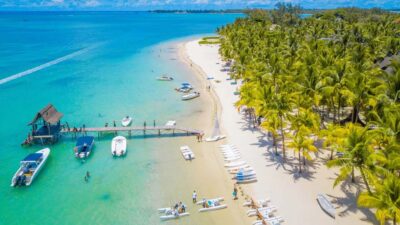Mauritius, a jewel in the Indian Ocean, has long been a haven for tourists seeking pristine beaches, vibrant culture, and unparalleled hospitality. In its 2025/26 budget, the Mauritian government announced a new tourist tax of €3 (approximately R62) per night, applicable to all visitors aged 12 and older staying in hotels, guesthouses, tourist residences, and domaines (vineyards). This measure, set to take effect from October 1, 2025, has sparked a heated debate: will it bolster the tourism sector and fund sustainable growth, or will it deter visitors and disrupt the delicate tourism ecosystem? As Mauritius aims to attract 1.4 million visitors by mid-2023 and beyond, the challenge is to implement a taxation strategy that strengthens the industry while encouraging more arrivals. This article explores the potential of tourist taxes to support Mauritius’ tourism sector and proposes innovative ways to tax visitors without compromising the island’s appeal.
The Context: Why Tax Tourists?
Tourism is a cornerstone of Mauritius’ economy, contributing significantly to GDP and employment. In 2017, the sector welcomed 1.34 million visitors, generating Rs 60.3 billion in revenue, a figure projected to grow to Rs 62.5 billion in 2018. By 2022, despite global challenges, Mauritius recorded 557,245 arrivals from January to August, with ambitions to hit 1 million by year-end. However, the influx of visitors strains infrastructure, environmental resources, and public services. The new €3 per night tax aims to generate revenue to address these pressures, funding improvements in tourist facilities, environmental conservation, and community development.
Yet, the introduction of the tax has raised concerns. Critics argue it could increase costs for visitors, potentially reducing Mauritius’ competitiveness against rival destinations like the Seychelles or Maldives. Proponents, however, see it as a sustainable funding mechanism to enhance the visitor experience and preserve the island’s natural and cultural assets. The key lies in designing a tax system that aligns with Mauritius’ goal of attracting more tourists while ensuring the sector’s long-term viability.
The Case for Tourist Taxes: A Global Perspective
Mauritius is not alone in taxing tourists. Globally, destinations like Venice, Norway, and France have implemented similar measures to manage overtourism and fund infrastructure. Venice’s €5 day-tripper tax, for instance, aims to reduce overcrowding, while Norway’s 3% per night tax in high-tourism zones supports public amenities like sanitation and parking. These examples suggest that well-designed tourist taxes can generate significant revenue without deterring visitors, provided the funds are visibly reinvested into improving the tourism experience.
In Mauritius, the €3 per night tax is modest compared to other destinations. For a family of four staying a week, the additional cost is €84—unlikely to be a dealbreaker for most travelers. However, the tax’s success depends on transparency and strategic allocation of funds. Tourists are more likely to accept additional fees if they see tangible benefits, such as cleaner beaches, upgraded public transport, or enhanced cultural sites.
Innovative Taxation Strategies to Bolster Tourism
To ensure the tourist tax strengthens rather than hinders Mauritius’ tourism ecosystem, the government can adopt creative and visitor-friendly approaches. Below are some of the best ideas for taxing tourists while encouraging more arrivals:
1. Tiered Taxation Based on Accommodation Type
Instead of a flat €3 per night tax, Mauritius could implement a tiered system based on accommodation luxury. For example:
- Budget accommodations (guesthouses, hostels): €1 per night
- Mid-range hotels (3-4 stars): €3 per night
- Luxury resorts (5 stars, domaines): €5 per night
This approach targets higher-income tourists who can afford premium accommodations, minimizing the financial burden on budget travelers. It also aligns with Mauritius’ strategy to attract diverse markets, from backpackers to affluent visitors. The additional revenue from luxury travelers can fund initiatives like eco-friendly transport or cultural festivals, enhancing the island’s appeal.
2. Optional Eco-Contribution with Incentives
Mauritius could introduce an optional “Eco-Contribution” at booking or check-in, allowing tourists to voluntarily contribute €5-€10 to environmental projects like coral reef restoration or reforestation. To encourage participation, contributors could receive perks such as:
- Free entry to national parks or cultural sites
- Discounts on eco-tours or public transport
- A “Green Traveler” certificate or badge
This approach appeals to environmentally conscious travelers, a growing demographic, and enhances Mauritius’ reputation as a sustainable destination. It also avoids mandatory fees, reducing resistance from cost-sensitive visitors.
3. Departure Tax for Short-Stay Visitors
To target day-trippers or short-stay cruise passengers, Mauritius could introduce a modest departure tax (e.g., €5-€10) at the airport or port for visitors staying less than three nights. This tax would:
- Generate revenue from high-turnover visitors who use infrastructure but contribute less to the economy
- Encourage longer stays, aligning with Mauritius’ goal of increasing average tourist spending and stay duration (currently 12.4 nights)
- Minimize impact on longer-stay tourists, who form the bulk of arrivals
Funds could be used to improve airport facilities or maintain cruise port infrastructure, directly benefiting departing visitors.
4. Activity-Based Micro-Taxes
Rather than taxing accommodations alone, Mauritius could apply micro-taxes to high-impact tourist activities, such as:
- Water sports (e.g., jet skiing, parasailing): €1 per activity
- Luxury dining experiences (e.g., fine-dining restaurants): 1% surcharge
- Golf courses: €2 per round
These taxes target discretionary spending, affecting tourists with higher budgets while sparing essential costs like accommodation or meals. Revenue could fund coastal conservation or training for local tourism workers, ensuring a better experience for visitors.
5. Seasonal Tax Adjustments
To balance tourism flows, Mauritius could adjust tax rates based on seasonality:
- High season (October-April): €3 per night
- Low season (May-September): €1 per night
Lower taxes during the low season could attract more visitors, boosting hotel occupancy (already at 65-85% in 2022 despite being off-peak) and supporting local businesses. This strategy aligns with Mauritius’ efforts to promote year-round tourism and tap into niche markets like Indian weddings or Middle Eastern travelers post-Ramadan.
Ensuring Success: Transparency and Reinvestment
For any tourist tax to succeed, Mauritius must prioritize transparency and reinvestment. Tourists are more likely to accept fees if they understand how their money is used. The government should:
- Publish annual reports detailing tax revenue allocation, as Norway does with its tourism tax.
- Create a “Tourism Enhancement Fund” to channel funds into visible projects, such as beach cleanups, upgraded public restrooms, or free Wi-Fi zones in tourist areas.
- Market the tax positively, branding it as a “Mauritius Preservation Fee” to emphasize its role in protecting the island’s natural and cultural heritage.
Additionally, funds should support training programs for tourism workers, addressing concerns about skill shortages raised by opposition leader Xavier-Luc Duval. A well-trained workforce enhances visitor satisfaction, encouraging repeat visits.
Mitigating Risks: Protecting the Tourism Ecosystem
To avoid deterring tourists, Mauritius must carefully calibrate its tax strategy. Key considerations include:
- Competitive Pricing: Monitor rival destinations like the Maldives, which saw 283,000 Chinese tourists in 2018 compared to Mauritius’ 66,000. Taxes should not erode Mauritius’ affordability.
- Marketing Campaigns: Intensify promotion in emerging markets like Saudi Arabia, the UAE, and Russia, as planned by the Mauritius Tourism Promotion Authority (MTPA). Highlighting tax-funded improvements can justify fees.
- Local Engagement: Encourage domestic tourism with tax exemptions or discounts for Mauritian residents, as hotels like La Pirogue and RIU already target locals during low seasons.
Conclusion: A Win-Win for Mauritius and Its Visitors
The €3 per night tourist tax is a bold step toward sustainable tourism in Mauritius, but its success hinges on strategic implementation. By adopting innovative taxation models—tiered rates, optional eco-contributions, departure taxes, activity-based fees, and seasonal adjustments—Mauritius can generate revenue without alienating visitors. Transparent reinvestment in infrastructure, conservation, and workforce development will enhance the tourist experience, reinforcing Mauritius’ status as a premier destination.
Far from a fiasco, a well-executed tourist tax could be a winning strategy, enabling Mauritius to welcome more visitors while preserving its natural beauty and cultural richness. As the island pursues its ambitious goal of 1.4 million arrivals, these measures can ensure that tourism remains a vibrant pillar of the economy for generations to come.
This article provides a comprehensive framework for taxing tourists in Mauritius, balancing revenue generation with ecosystem preservation. By implementing these strategies, Mauritius can turn the tourist tax into a catalyst for growth, attracting more visitors while safeguarding its unique appeal.






I can’t believe how much value you packed into this post. It’s a must-read for anyone in the field.
I’m glad the post provided so much value! Thanks for your encouraging words.
Your passion for the subject really shines through in this post. Keep it up!